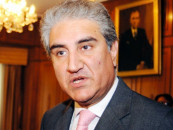Webinar discusses economic reforms
Experts urge inclusive implementation, broader tax base & political maturity

A webinar on the subject ‘The Prospects of Charter of Economy for the new government and the new IMF deal’ was held in Islamabad with several prominent economists and experts in attendance.
The event was organised by the Devcom (Development Communications Network) Pakistan and DTN to discuss an inclusive political economy that speakers emphasised should be the top priority of the Pakistan government without any political fiddling by any of the stakeholders.
They underscored the need of the hour for politicians to sit in the parliament, do the legislation and ensure its implementation in letter as well as spirit.
They further instructed that whatever party comes into power should limit the federal ministries count to ten. Then ministers should pass on the vision and mandate to the teams of the technocrats as they know their job well. The performance of the governments world over depends on the technocrats based on ‘right person for the right job’.
Some expressed the notion that the IMF is not a villain, but a fiscal regulator. Which means that the government will need to comply with its proposed measures and take them accordingly. All the political parties and other stakeholders should come together to handle the budget deficit and increase tax base to get rid of the subsidies and reduce state expenses.
Read China to deepen economic reforms, 'opening up'
They advised that shrinking the bureaucracy and implementation of civil service reforms is a must to reduce burden on the national exchequer. The sluggishness and red-tapism, which they called the hallmark of Pakistan’s bureaucracy should be let go off. The other issue is the politics of agitation that should come to an end.
They also talked of the public’s role in discouraging any protest legislations that would serve vested interests of politicians.
Speaking at the webinar, political activist Dr Nasir Khilji said that all the stakeholders of the country have to take the responsibility of inclusive economic reforms and their true implementation.
He said that the reforms should include a comprehensive strategy to handle the budget deficit and reduce the nonproductive and operational costs. He added that Pakistan has to broaden its tax, wipe off subsidies and reduce the financial burden of bureaucracy that produces hurdles only.
Dr Khilji emphasised that major surgery is required for Pakistan’s entire financial management and governance system. “It is not possible without having all the stakeholders on the same page. They have to come on the same page if they care about 250 million people,” he said.
“Pakistan is a library of recommendations but no implementation of any proposed frameworks,” he further added.
Published in The Express Tribune, February 20th 2024.



















COMMENTS
Comments are moderated and generally will be posted if they are on-topic and not abusive.
For more information, please see our Comments FAQ